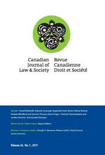
Canadian Journal of Law and Society
Scope & Guideline
Navigating the Complexities of Law Through a Social Lens
Introduction
Aims and Scopes
- Interdisciplinary Legal Studies:
The journal focuses on the intersection of law with various social sciences, including sociology, anthropology, and political science, encouraging a broad range of methodologies and theoretical frameworks. - Critical Examination of Legal Systems:
It emphasizes critical analyses of existing legal systems, exploring issues such as justice, equity, and the impacts of law on marginalized communities. - Socio-Legal Research:
The journal promotes empirical research that investigates the impact of law on society, including studies on legal practices, compliance, and the lived experiences of individuals within legal systems. - Focus on Contemporary Issues:
It addresses pressing contemporary issues in law and society, such as human rights, social justice, and the implications of recent events like the COVID-19 pandemic on legal frameworks. - Indigenous Legal Perspectives:
The journal includes discussions on Indigenous law and governance, acknowledging the historical and ongoing effects of colonialism on legal systems in Canada.
Trending and Emerging
- Impact of the COVID-19 Pandemic on Law:
Recent publications extensively explore the legal ramifications of the COVID-19 pandemic, including discussions on incarceration, public health law, and the shifting paradigms of governance during crises. - Social Justice and Equity:
There is a growing emphasis on themes related to social justice, equity, and the rights of marginalized communities, reflecting a broader societal push towards inclusive and equitable legal frameworks. - Digital Rights and Privacy:
Emerging research focuses on digital rights, privacy concerns, and the implications of technology on law, particularly in relation to children and vulnerable populations. - Indigenous Rights and Legal Pluralism:
The journal is increasingly publishing works that examine Indigenous rights, legal pluralism, and the intersection of Indigenous governance with Canadian law, highlighting the importance of these perspectives in contemporary legal discourse. - Alternative Dispute Resolution Methods:
There is a notable trend towards exploring alternative methods of conflict resolution, recognizing their potential to address legal disputes outside of traditional court systems, thereby promoting access to justice.
Declining or Waning
- Traditional Legal Doctrines:
There appears to be a diminishing focus on traditional legal doctrines, as the journal increasingly emphasizes critical and contextual analyses over formalistic legal interpretations. - Historical Legal Studies:
Research centered on historical legal frameworks and practices seems to be waning, potentially overshadowed by more contemporary and urgent socio-legal issues. - Conventional Policing Studies:
While policing remains a significant theme, conventional studies focused solely on policing practices without a socio-legal context are becoming less common, with a shift towards critical examinations of systemic issues. - Legal Formalism:
There is a noticeable decline in publications that adhere strictly to legal formalism, as the journal increasingly favors interdisciplinary approaches that incorporate social, cultural, and political dimensions.
Similar Journals

UNIVERSITY OF ILLINOIS LAW REVIEW
Exploring Innovative Insights in Contemporary LawUNIVERSITY OF ILLINOIS LAW REVIEW, published by the esteemed University of Illinois, stands as a pivotal forum for legal scholarship since its inception. With an ISSN of 0276-9948 and an E-ISSN of 1942-9231, this journal serves the legal community by offering rigorous analyses and innovative insights into contemporary legal issues, making it an essential resource for researchers, legal practitioners, and students alike. Although not an open-access journal, it operates within the United States, with contributions stemming from a rich academic tradition. Notably, it holds a respectable Q3 category ranking in Law according to the 2023 category quartiles and ranks 360th out of 1025 in the Scopus Social Sciences Law rankings, placing it in the 64th percentile, affirming its significance in the legal discourse. The journal's scope encompasses a broad range of legal topics, from constitutional law to international legal studies, thus catering to a diverse readership keen on advancing their understanding of the law. In an era marked by evolving legal landscapes, the UNIVERSITY OF ILLINOIS LAW REVIEW remains committed to fostering intellectual engagement and promoting scholarly exchange among all members of the legal field.

UNIVERSITY OF NEW SOUTH WALES LAW JOURNAL
Advancing Legal Scholarship Through Interdisciplinary InsightsUniversity of New South Wales Law Journal, published by the University of New South Wales, Faculty of Law, is a leading academic journal that serves as an essential platform for discourse in the field of legal studies. With an ISSN of 0313-0096 and an E-ISSN of 1839-2881, the journal has been a beacon of legal scholarship since its inception in 1983. Operating from Kensington, New South Wales, Australia, it provides profound insights into various legal issues, emphasizing interdisciplinary perspectives by also being recognized in the fields of philosophy, sociology, and political science. While it maintains a Q3 ranking in Law and has shown increased visibility in Philosophy at Q2 according to the 2023 category quartiles, the journal assures a diverse range of critical analyses from scholars, professionals, and students alike. It is particularly valuable for researchers seeking to engage with contemporary legal debates, ensuring they remain at the forefront of academic and practical discussions in law and related disciplines.
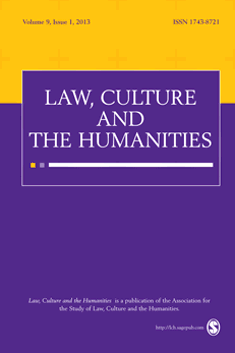
Law Culture and the Humanities
Cultivating Critical Perspectives on Law and CultureLaw Culture and the Humanities, published by SAGE Publications Ltd, serves as a pivotal forum for interdisciplinary dialogue at the intersection of law and the humanities. With an ISSN of 1743-8721 and an E-ISSN of 1743-9752, this esteemed journal has been contributing to scholarly discourse since its inception in 2005 and continues to do so until 2024. The journal carries a respectable impact factor showcased through its category rankings: Q3 in Arts and Humanities (miscellaneous), Q2 in Cultural Studies, and Q3 in Law. Its Scopus rankings reflect an impressive standing in the social sciences, particularly within Cultural Studies and Law, indicating that it is a fundamental resource for researchers and professionals aiming to explore the nuanced relationships between legal frameworks and cultural expressions. While not an Open Access journal, it offers substantial insights into contemporary debates, making it essential for academics and students engaged in the study of law's cultural dimensions.

Ciencia Juridica
Advancing Legal Scholarship with Rigorous ResearchCiencia Juridica is a distinguished academic journal published by UNIV GUANAJUATO, dedicated to advancing the field of legal studies. With its ISSN 2007-3577 and E-ISSN 2007-6142, this journal serves as a pivotal platform for scholars, researchers, and practitioners to disseminate innovative legal research and analysis. Although currently not an open-access journal, it ensures robust peer-reviewed content that maintains the highest academic standards. By focusing on a comprehensive range of legal topics, Ciencia Juridica aims to contribute significantly to the scholarly dialogue within the legal community, fostering critical thinking and innovative approaches to complex legal issues. The journal's commitment to enhancing legal scholarship makes it an essential resource for anyone engaged in the study or practice of law in Mexico and beyond.
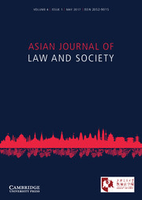
Asian Journal of Law and Society
Advancing the Dialogue on Law and Society in AsiaAsian Journal of Law and Society, published by Cambridge University Press, serves as a vital platform for scholarly discourse in the fields of law and social sciences. With an impressive 2023 impact factor placing it in the Q2 quartile in both law and sociology/political science categories, this journal is influential in shaping contemporary legal and sociological thought. Covering a broad range of topics, from legal frameworks in Asian contexts to the interplay between law and societal dynamics, the journal invites researchers, practitioners, and students to contribute original articles, critiques, and interdisciplinary analyses. Although it does not currently offer open access options, the Asian Journal of Law and Society continues to be recognized for its significant contributions, as reflected in its Scopus rankings, where it is positioned in the top 30% of law journals and around the 44% ranking in sociology and political science. This trajectory highlights its importance for anyone interested in understanding the complex legal landscapes and social structures across Asia.

UNIVERSITY OF TORONTO LAW JOURNAL
Pioneering Insights in Law and SocietyUNIVERSITY OF TORONTO LAW JOURNAL, published by University of Toronto Press Inc, stands as a distinguished platform in the realm of legal scholarship, having served the academic community since its inception. With an ISSN of 0042-0220 and an E-ISSN of 1710-1174, this quarterly journal is not only recognized for its rigorous peer-review process but also boasts an impressive Q2 rank in Law and a Q3 rank in Sociology and Political Science as per the 2023 category quartiles. The journal aims to foster advanced knowledge and discourse on various legal issues, thereby appealing to researchers, professionals, and students alike who are eager to engage with contemporary legal debates. It is noteworthy that the journal currently does not offer open access, ensuring the integrity and quality of its publications for a subscribed audience. Published in Canada and available for a wide readership, the UNIVERSITY OF TORONTO LAW JOURNAL continues to be a pivotal source for critical analyses and fresh insights in the fields of law and social sciences, contributing significantly to the understanding and evolution of legal frameworks.
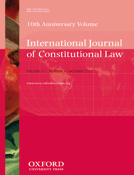
ICON-INTERNATIONAL JOURNAL OF CONSTITUTIONAL LAW
Championing Rigorous Analysis in Constitutional LawThe ICON - International Journal of Constitutional Law is a premier publication in the field of constitutional law, published by the esteemed Oxford University Press. With its ISSN 1474-2640 and E-ISSN 1474-2659, this journal has established itself as a vital resource for legal scholars, practitioners, and students alike, offering nuanced analyses and critical discussions from 2005 to 2024. Ranked in the top Q1 category for law, with a Scopus ranking of 258/1025 (74th percentile), the ICON journal is dedicated to exploring essential themes of constitutional governance and the challenges faced by legal systems worldwide. Although it does not currently offer open access, its rigorous peer-reviewed articles contribute significantly to the scholarly discourse in constitutional law, providing invaluable insights that are integral to both academic research and practical application. The journal's office is located at Great Clarendon Street, Oxford OX2 6DP, England, reinforcing its prestigious position in the legal publishing landscape.

International Journal of Criminal Justice Sciences
Empowering scholars with open access to critical knowledge.The International Journal of Criminal Justice Sciences is a premier academic publication dedicated to advancing the field of criminal justice through rigorous research and innovative scholarship. Published by MANONMANIAM SUNDARANAR UNIVERSITY in India, this Open Access journal has been a vital platform for researchers since 2006, promoting unrestricted access to critical knowledge and insights in the realm of law and criminal justice. With a commendable Scopus ranking of #379 out of 1025 in the Social Sciences - Law category, placing it in the 63rd percentile, it holds an essential position for those engaged in legal studies. The journal is particularly beneficial for academics, practitioners, and students aiming to explore contemporary issues, innovative practices, and theoretical advancements in the discipline. Its commitment to quality research is reflected in its Q3 Quartile designation and the continuous convergence of research contributions anticipated from 2017 to 2024. Whether you are looking to publish your findings or seek valuable insights from peer-reviewed articles, the International Journal of Criminal Justice Sciences remains an indispensable resource for fostering knowledge and dialogue in this critical field.
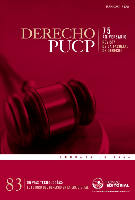
Derecho PUCP
Fostering innovative scholarship in law.Derecho PUCP is a distinguished open access journal published by the Pontificia Universidad Católica del Perú, specifically from the Faculty of Law. With a commitment to advancing legal scholarship, this journal has been an essential resource in the field of law since 2005, providing researchers, practitioners, and students with access to critical analyses and discussions on various legal topics. Based in Lima, Peru, Derecho PUCP holds a prestigious position with a Q2 ranking in the Law category, reflecting its impactful contributions to the social sciences, particularly in the legal domain. The journal publishes cutting-edge research and promotes innovative discourse, aiming to foster academic excellence and engage with contemporary legal challenges. As it continues to converge into its future issues from 2019 to 2024, Derecho PUCP exemplifies a vital platform for those committed to the pursuit of legal knowledge and research.

London Review of International Law
Engaging Minds on Contemporary Legal ChallengesThe London Review of International Law, published by Oxford University Press, is a prominent journal dedicated to advancing scholarship in the field of international law. With a focus on fostering critical discourse and interdisciplinary engagement, this periodical offers a platform for researchers, practitioners, and students to explore contemporary legal issues shaping global governance. Although the journal operates as a subscription-based resource, it does not currently provide open access options, thereby ensuring a curated selection of high-caliber, peer-reviewed articles intended to uphold rigorous academic standards. Since its inception in 2013, the London Review of International Law has been recognized within the Q3 category in Law for 2023, and it holds a respectable rank of #628 out of 1025 in the Scopus Law category. As the journal continues to innovate and reflect the dynamic nature of international legal discourse, it remains an essential resource for legal professionals and academics alike, enhancing their understanding and engagement with pressing global legal challenges.